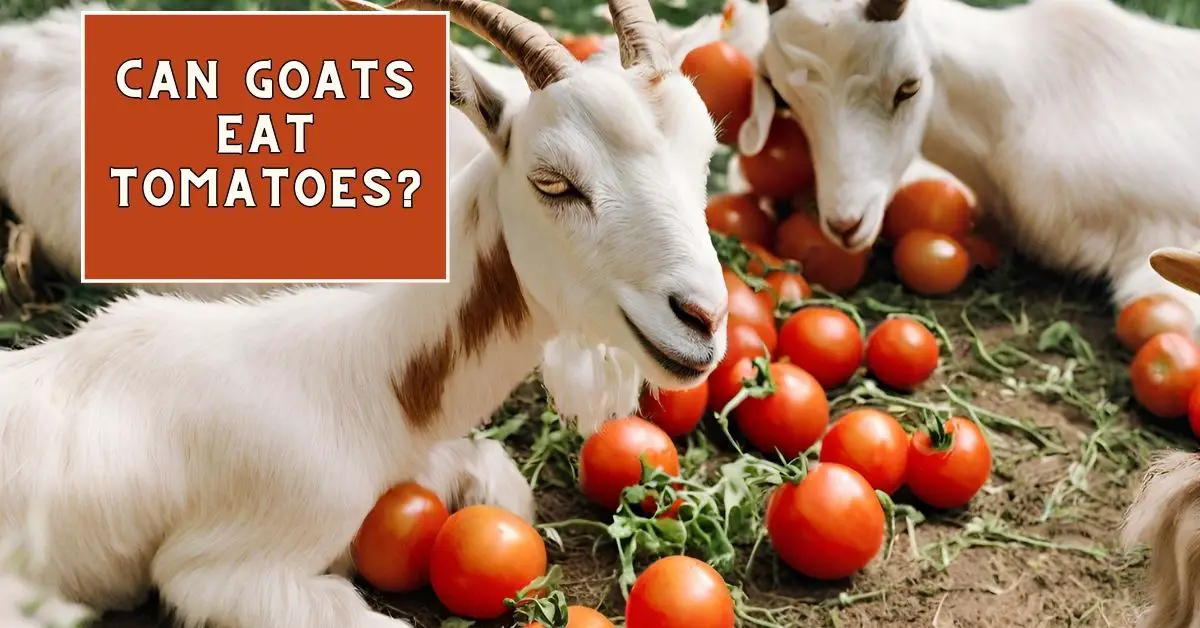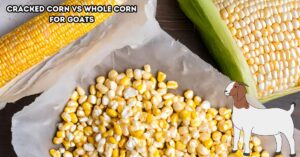You may already know how popular it is for individuals to have goats in their backyards. However, I also enjoy caring for the cute goats. Goats are beneficial in a variety of ways. In comparison to humans, they are brilliant creatures with solid memories. In addition to giving us meat and milk, these herbivores have the advantage of giving birth to many baby goats in a single birth. Because of this, they are good creatures that are very valuable to us.
But as a goat owner, I am also aware of how particular these animals are about the food they consume. If you put anything in front of them for eating, they will only leave it once they attempt to check the taste of it.
As a result, can goats eat tomatoes? Do they not risk getting sick if they consume tomatoes? Let’s start exploring all the relevant information in this post in depth.
Table of Contents
Can goats eat tomatoes?
As you know, using tomatoes in kitchen recipes is very common. It is a tiny fruit, but we use it as a vegetable in our dishes. Hence, in addition to humans eating tomatoes, goats can also devour them. But only a blanched number of tomatoes is healthy for your goats. Too much consumption of tomatoes causes digestive or gastrointestinal problems in goats. You also need to avoid giving them other parts of the tomato plant.
7 Potential nutritional health benefits of feeding tomatoes to goats
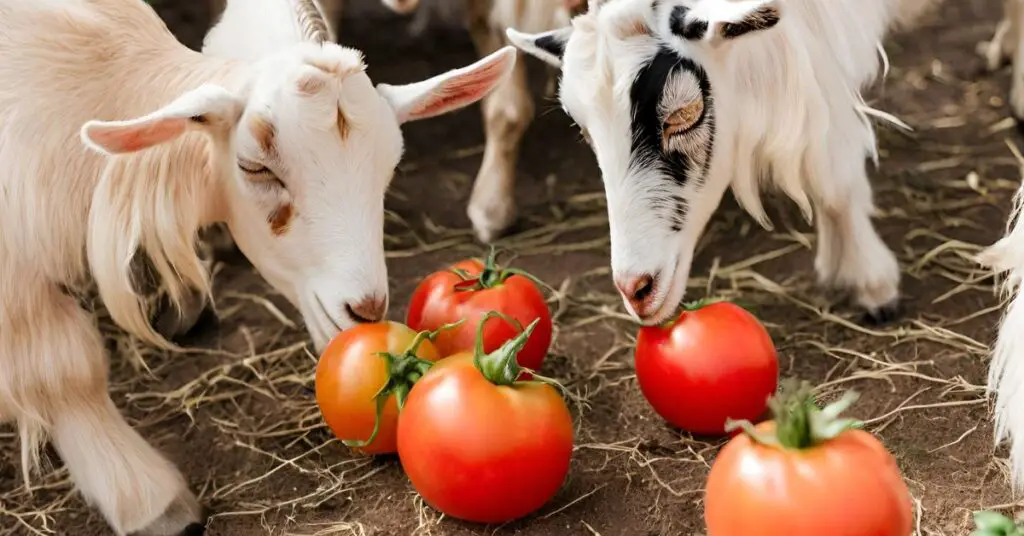
Tomatoes are rich in vitamins and antioxidants. They are excellent sources of vitamins C and K and minerals such as phosphorus, potassium, and magnesium. Protein and carbohydrates are also present in reasonable amounts in the tomatoes. Additionally, they are also a powerful source of water. Now, talk in detail about the health benefits your goats get from the nutrients in the tomatoes.
Rich source of vitamins
Tomatoes are beneficial for goats due to the presence of crucial vitamins such as vitamin C, vitamin K, and vitamin B9.
The vitamin C content in tomatoes helps boost the immune system of goats. It is also necessary to assist the goats’ immune systems in fighting off harmful infections and illnesses.
Vitamin C helps keep the cells of the goat’s body healthy and strong. It is also great for strengthening the goat’s bones.
Vitamin C helps to improve the skin cells and enhance the quality and glow of the skin. As a result, many people use it as a face mask. As a result, it keeps the goats’ coats healthy.
The vitamin C in tomatoes is an excellent source of healing. As a result, if your goat gets an external wound, you should feed them tomatoes, which contain the vitamin C required for wound improvement or healing.
The vitamin K in the tomatoes is beneficial to making the clots in the goats’ blood because your goat will never lose a lot of blood if injured.
The vitamin B9, also called folate, is also found in a decent amount of tomatoes. It is crucial to the production of the DNA and RNA in the white blood cells and the red blood cells in the marrow of goats.
It is a good source of minerals.
Tomatoes are a good source of magnesium, potassium, and phosphorus, which all help to keep the goats’ overall health solid and healthy. The potassium content of tomatoes aids in regulating fluids in goats’ bodies and preventing bone cancer and kidney stones. These minerals help to improve the nervous systems of goats.
A rich source of lycopene
Lycopene, a powerful antioxidant found in tomatoes, helps prevent the development of heart disease and cancer. Some studies have shown that lycopene is a very advantageous antioxidant for goats and humans. Hence, they provide a lot of health benefits to the goats.
Improve the health of goat digestion
The dietary fiber in the tomatoes helps boost the goats’ digestive system. They also help clean the digestive tract. Additionally, it is beneficial for improving and regulating their digestive work properly.
Improve the bowel issues.
The crucial nutrients in tomatoes are beneficial to keep the bowels of your goats working correctly. However, if your goat gets any bowel issues, give them a decent number of tomatoes, which aid in treating bowel issues.
Source of high-water content
The tomatoes almost entirely contain water. The water content is beneficial for goats in the summer. It helps keep them hydrated through the hot days. Hence, feeding tomatoes in hot months is an excellent choice.
Assist in increasing milk production
The beneficial nutrients and vitamins in the tomatoes aid in the increase of milk production in the goats. Hence, providing them with tomatoes is an excellent way to get them a good quantity of milk.
Before Feeding the Tomatoes to the Goats, Keep the Following Things in Mind
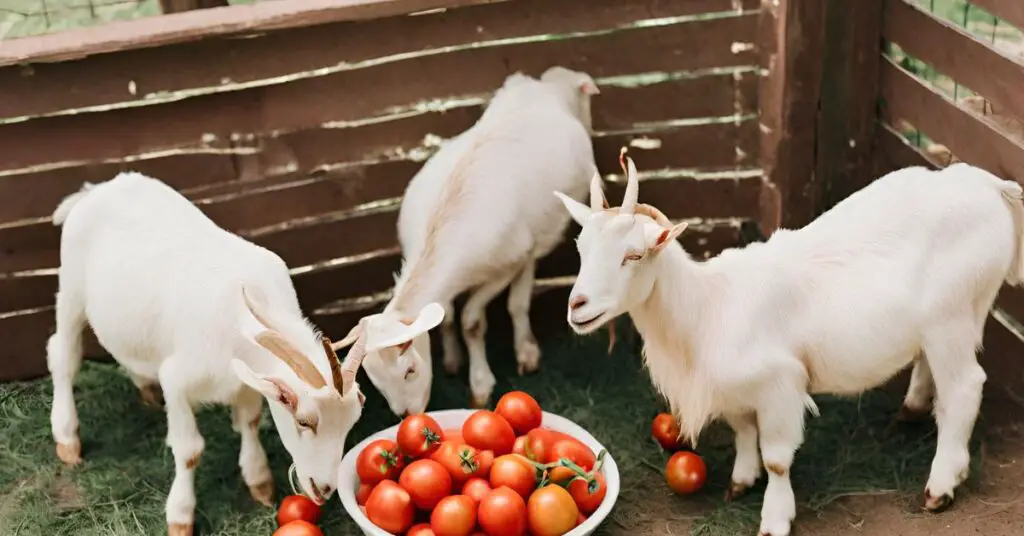
Here are some essential things to remember when considering giving tomatoes to goats.
Never feeding them unripe tomatoes.
You should need that to avoid feeding the green and unripe tomatoes to the goats. Because the unripe or green tomatoes contain solanine, which is very toxic and dangerous for the goat’s health, if your goat consumes solanine through the green tomato, it will develop several health problems.
Avoid giving the leaves and stems of the Tomato plant.
You will also need to keep your goats away from the tomato plants because the plants are not toxic for humans but are also dangerous for goats and other livestock. The poisonous alkaloids are present in the leaves and stems of the tomato plant. If your goats consume even a tiny amount of the alkaloids produced by the tomato plant, it will be fatal, resulting in various health issues in the goats. So, never feed them the leaves and stems of the tomato plant.
Not feed them the tomato skin.
The tomato skin is hard for goats to digest. Hence, whenever you feed them tomatoes, you remove the skin or peel of the tomato. So they digest them very quickly without having any issues.
Avoid giving moldy or rotten tomatoes
It would help if you never fed rotten or moldy tomatoes to your goats. If you are not interested in consuming moldy tomatoes, never give them to your four-legged friends. The toxins present in mold food and tomatoes are dangerous for goat health.
Pesticides and chemicals
Before feeding the goats, you must ensure that the tomatoes contain no chemicals or pesticides. You should ensure that the tomatoes do not have pesticides before serving them to your goats because they are fatal. Many commercially prepared tomatoes contain dangerous chemicals on their skin.
How can I feed the tomatoes to my goats?
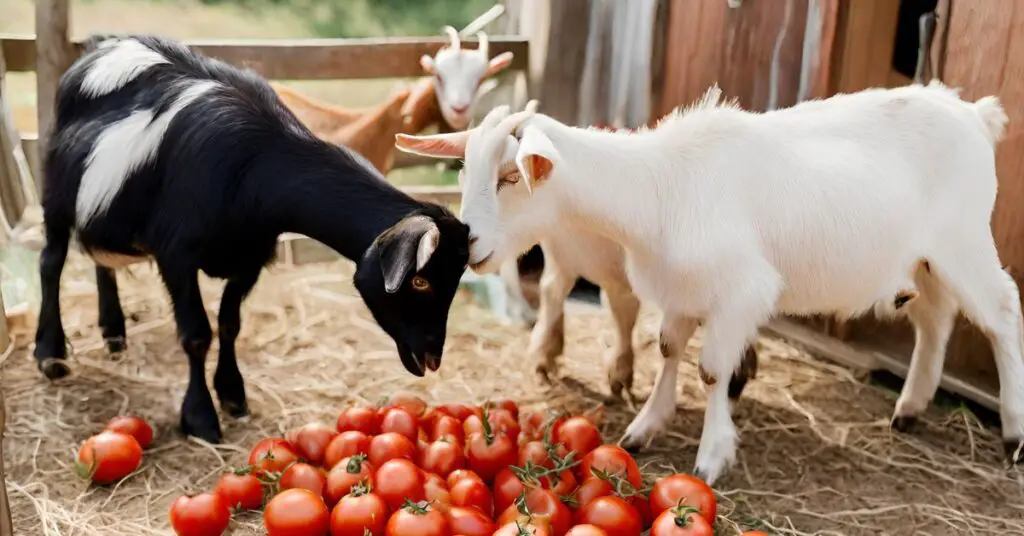
The goats enjoyed devouring the tomatoes. Hence, numerous ways exist to feed and prepare the goats’ tomatoes. However, now we will discuss the step-by-step guidance for designing and feeding tomatoes to the goats. It is beneficial for their digestion.
Make sure the tomatoes are ripe.
You should ensure that the tomatoes are ripe. The ripe tomatoes are red and very juicy. Hence, it is always preferable to feed the ripe tomatoes, which are perfectly safe for their consumption.]
Wash the tomatoes
The next step is to wash the ripe tomato in clean water. It will ensure that the tomatoes do not contain any toxic chemicals or pesticides, and this procedure eliminates all bacteria and germs. So, after washing them, pat them dry with a towel.
Serve them by chopping.
You can serve them by chopping the tomatoes into small slices. So, they quickly devour it. But you can also feed them the whole tomato without any issue.
Mix in their feed.
You can also incorporate this delectable fruit into the goats’ other meals or foods. Because it contributes to the goat’s meal being very nutritious and tasty.
How often and how many tomatoes should I feed my goats?
As you may know, anything we consume excessively hurts our health. Hence, it would be best to serve this snack to your backyard goats only in a measured amount. You feed them tomatoes only once a week.
Can the over-ingestion of tomatoes pose any health risks to goats?
Yes, overconsumption of tomatoes causes gastrointestinal problems, upset stomachs, and kidney stone issues in your goats.
Final thoughts
Hence, the moderate amount and occasional use of ripe tomatoes are suitable for the goat’s health. Because of hazardous alkaloids, unripe tomatoes and other parts of the tomato plant are dangerous for goats. Ripe tomatoes, on the other hand, provide a variety of health benefits to your four-legged friends.

